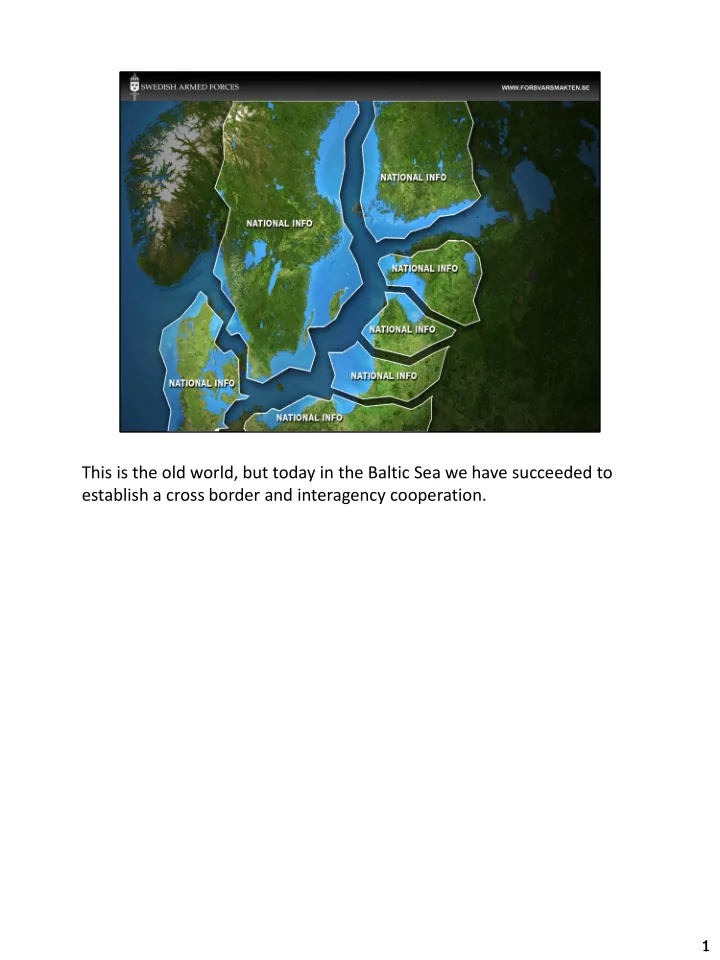

This is the old world, but today in the Baltic Sea we have succeeded to establish a cross border and interagency cooperation. 1 1
The result of the cooperation is that national contributions now has been merged and together created a multilateral, improved Maritime Situational awareness (MSA) and a deepened common maritime picture, hence creating a higher level of common maritime safety and security in the Baltic Sea. 2 2
It started around 15 years ago when the Swedish and Finnish navies launched a bilateral cooperation to achieve a common maritime picture, in the Northern part of the Baltic Sea. The co-operation is called SUCFIS = Sea-surveillance co-operation Finland Sweden. It has been in operational use since 2006 and it is a intelligent interface between two completely autonomous surveillance systems. We exchange on daily bases target information from various sources and in addition to that added value information and daily reports. 3
The success of SUCFIS encouraged us to take a second step and create yet another cooperation named SUCBAS. Today it embraces all states surrounding the Baltic Sea, with the exception of the Russian Federation. Russia was invited when establishing the enlarged community, but Russia has so far not officially approached SUCBAS with an application for a membership. SUCBAS is neither a physical system nor a machine. SUCBAS is a Maritime Domain Awareness co-operation between countries in the Baltic Sea Area. It is an unclassified open system, but we are moving towards the ability to handle classified information as well. SUCBAS was aimed to develop a concept with a technical solution, in order to enhance the Maritime Domain Awareness in the following areas; territorial integrity, safety, environment and maritime economy, through sharing information between the agencies and countries with an interest in the maritime domain. The SUCBAS initiative was launched in Sept 2008 and was completed with all members a year later during the Swedish chairmanship of the European Union. In Feb 2010 SUCBAS was operational. 4
Key factors for success in the establishment of SUCBAS have been: • The use of present, up and running, national systems and sensors, instead of investing in new systems • Every nation can chose its own level of cooperation, depending on the national conditions respectively. • Step by step approach based on a common will and understanding of the need to share information. I want to once again stress that both SUCBAS and SUCFIS are today fully operational systems and fulfil their tasks 24/7. 5
However, this is not enough, we need to move further on. We need to be even more efficient and increase the quality of the shared information. Sweden, for example, has a very complicated network of governmental agencies working in the Maritime environment and we are currently exploring more fields of interagency cooperation between our agencies working in the maritime domain. I know that many of our partners around the Baltic have a similar challenge within their respective countries. 6
Apart from deepened interagency cooperation the future also includes new technical possibilities, with system integration on a much higher level than today. The EMSA briefing yesterday clearly pointed out where we stand right now. Sweden currently are in a development process where other agencies in the maritime domain are to support our Maritime Domain Awareness, with for example, VMS information through the Swedish agency for marine and water management, (the former Swedish board for fisheries), information from the Coast guards MPA and optronic sensor information from port authorities. But most of it is already there! The future is about a technical solution, it is about building trust. Trust leads to more cooperation and more cooperation means more accurate and updated information. But, building trust takes time. 7 7
My summary and message to this distinguished auditorium are as follows: 1. The types of threats that meets us today is much more diverse than the ones before. To counter this challenges Navies and other governmental agencies working in the Maritime domain need to transform and to cooperate. 2. SUCFIS and SUCBAS are well-functioning cooperation's, but we are constantly looking for areas where we can cooperate even deeper with our neighbours in the region, in order to be more efficient, share the burden and to save money. Most nations also need to overcome the domestic rivalry between governmental agencies, in order to better economize the states resources and reducing duplication of efforts. 3. Talking about an increased regional cooperation. Sweden is pro strong, regional cooperation in many different fields. Cooperation built on mutual confidence and a will to share information with other nations. Strong regional cooperation is already established in some areas on the globe, such as the Baltic, the Mediterranean and in Singapore Strait region. Sweden supports a further development of this regional information sharing cooperation initiatives and to widen and deepen cooperation between them. We also take part in and support EU’s different working group’s for exchange of information. I want to underline that from our perspective, SUCFIS and SUCBAS don’t compete with any of the European Unions initiative, instead we think that they both will fit very well into future cooperation in several areas. 4. Once again, the key word to counter the challenges in the future is building trust. By doing so we will automatically have increased cooperation, domestically and regionally. We must be prepared that new threats not yet discovered will occur. An open approach, willingness to cooperate and an open mind will help us to create a secure and safe environment today and tomorrow.
THANK YOU FOR YOUR ATTENTION. 9
Recommend
More recommend